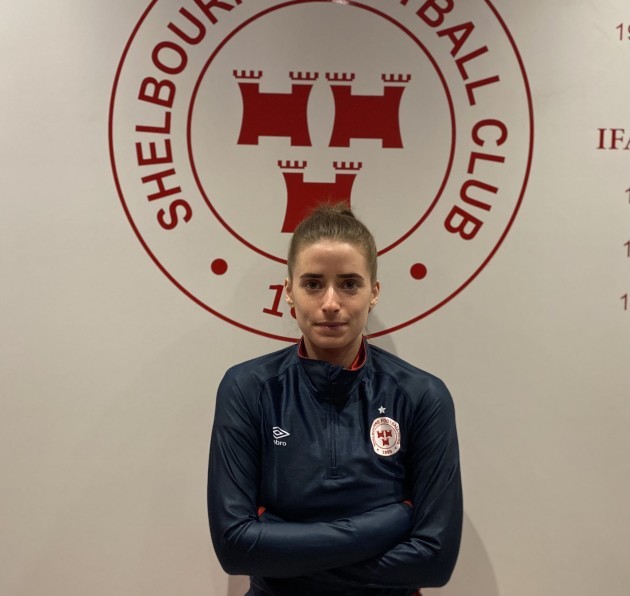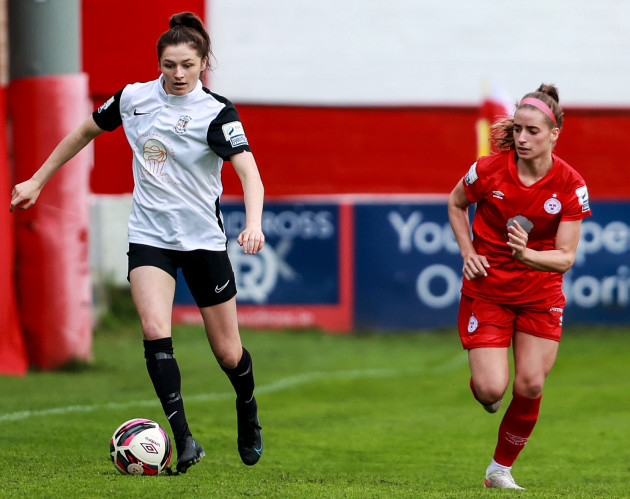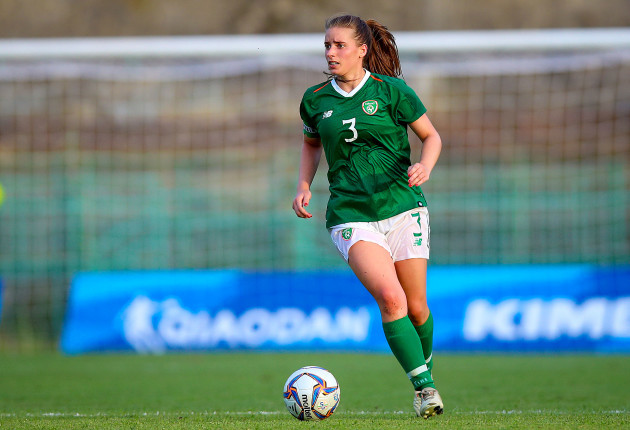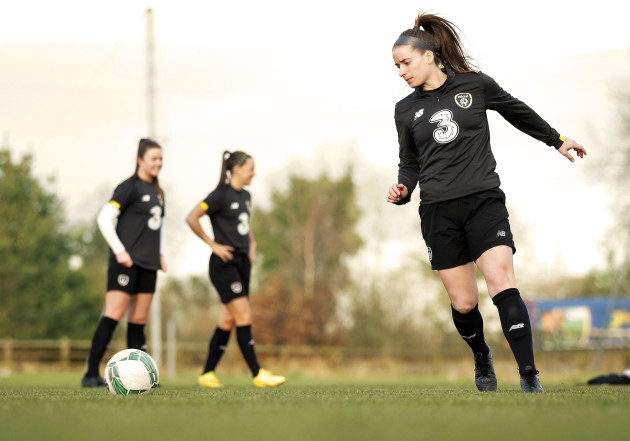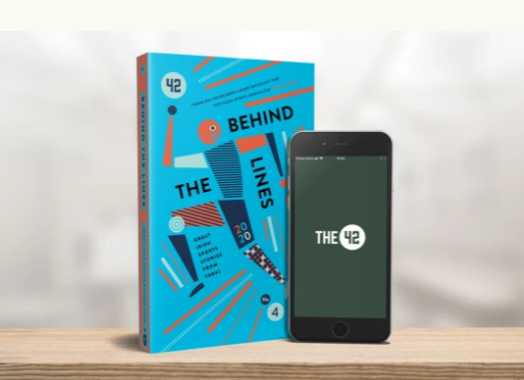CHLOE MUSTAKI’S WORLD didn’t exactly come crashing down the moment she was hit with the injury every sportsperson ever fears.
The dreaded cruciate curse struck on the the eve of a potential senior debut for the Republic of Ireland, just minutes from the end of the team’s final training session before their Euros qualifier victory over Greece in March 2020.
Mustaki’s knee buckled after an innocuous challenge involving a team-mate, and the scan confirmed the worst: she had ruptured her anterior cruciate ligament [ACL].
Devastatingly so, just as she teetered on the edge of a major breakthrough in her football career.
“Obviously there was a 24-hour period where I was just upset,” the Shelbourne star, who can operate in defence and midfield, recalls. “But to be honest, pretty quickly, I just accepted it.
“I thought, ‘This is fine, I’ll get through this. I’ll be back in a year.’ The way I saw it, it was an injury that a lot of people around me had gone through. So in my mind, I thought, ‘Well, if they can get through it, there’s no reason why I can’t.’
It transpired that mentally and physically, it was a much more difficult road than I had anticipated. I had absolutely no idea how tough it was actually going to be.”
***
Ups and downs, highs and lows, good days and bad.
That doesn’t just sum up the last year-and-a-half of Mustaki’s life, it epitomises her 26 years in this world to date.
She stared death in the eye when she was diagnosed with Hodgkin’s lymphoma — a type of blood cancer — at the age of 19, making a full recovery after intensive treatment. “You’re never faced with the possibility of dying when you’re so young. You don’t think about it,” as she told The42 in 2019, opening up on her harrowing experience.
Suddenly, football was put into perspective — and just weeks after captaining her country at the 2014 U19 European Championships. It’s just a game after all, this was life and death.
But as Jurgen Klopp famously said, football is the most important of the least important things. Mustaki strikes that balance with each and every word she utters, as she continues her return to full fitness after an 18-month lay-off.
She’s ready to etch her name into history today as Shelbourne face DLR Waves in the first-ever Women’s National League [WNL] clash to be shown live on national television.
But most importantly, she’s back back playing football with a smile on her face after a long and winding road.
“It’s amazing,” she beams. “In all honesty, I’m not quite there yet. I mean, I’m back playing but I’m still managing my knee to an extent and I’m still having to do a lot of rehab every single week to make sure that I can keep playing because I’m not at the point yet where my knee is 100% able to sustain all intensity levels throughout the week.
“In the background, I’m working hard to make sure that I can play at the weekend. So I’m looking forward to the stage where I’m not having to put in so much work to keep all my muscles and my knee happy — but I am absolutely delighted.
It’s probably the toughest thing I’ve ever had to endure, which obviously, given my medical history, is something big to say, in a way.
“It was a tough slog, it continues to be a tough slog but I just need to remain positive. I have great people around me when it comes to Shels, international squads, friends and family who have supported me throughout. I’m more determined than ever to make it through the other side 100% and push on forward and hopefully have a few more years of a successful soccer career, whether that be here, in England, or anywhere else really.”
about myself than I ever thought it could. When you’re going through hell (relatively speaking) - Just. Keep. Going. Thank you to everyone who helped me along the way, but special mention to @enda_king for his patience & creativity in dealing with a cranky knee (&human!). Next 😎
— Chloe Mustaki (@CMustaki) August 22, 2021
Mustaki was playing with Charlton Athletic at the time of her injury. Having taken a job with an executive recruitment company in London, she simultaneously forged another career for herself in the FA Championship, the second-tier of women’s football across the water.
That all came to an unfortunate standstill due to the setback, as the pandemic took hold.
She returned home to Dublin, and her surgery was fast-tracked due to the Covid-19 crisis, which she says, “had its pros and cons”.
The earlier-than-expected knee reconstruction was certainly a positive at the time, as was the fact that she looked set to miss far less football than she first anticipated.
The delay in access to a gym post-op amidst restrictions and lockdowns was one downfall, as was the lack of touch points and increased loneliness through the first phase of her rehab.
In terms of severity of what was going on around the world, it wasn’t a big deal. In a way it allowed me to be even more dedicated to my rehab but from a mental perspective, I don’t think I really fully realised what impact it was having.”
Mustaki ploughed on. One foot in front of the other, desperately missing kicking a ball and running. She saw this as a completely separate challenge to her battle with Hodgkin’s lymphoma; difficult and draining in a different way.
It’s not the world against you, it’s just you against yourself, as her Twitter bio reads.
And that’s a statement which rang true with each passing day on her road to recovery.
It proved an uphill struggle as time ticked on, Mustaki always giving it her all, though suffering setbacks and complications as the standard nine-month-to-a-year return-to-play estimate slipped away.
She did her utmost to stay positive and not compare herself to others, but that proved difficult at times.
“It took me so long to get back — and that wasn’t a factor of how hard I was working or how meticulous I was with my rehab, unfortunately everyone’s body is different and my knee was just particularly cranky and difficult.
“A big issue for me was seeing girls around me, left, right and centre, come back from this a lot quicker than me — and that was difficult because I was giving it 100%.
Time was going on and on and on and I wasn’t back and I just felt a bit lost. I felt confused, I felt angry, I felt frustrated.
“When I asked around to individuals who had gone through it and they hadn’t really experienced the same thing, that’s when you start to doubt yourself and that’s when you start to get really upset.
“If you’re putting in the time and the effort and you’re you’re getting the rewards that you should be in a timely fashion that’s all fine — and for me, when I tore my ACL, I was totally okay with that process, but when it came to the stage where I wasn’t seeing those improvements, I wasn’t nearly back, I wasn’t on the same trajectory that most people go on when they come back from an ACL, I got really frustrated.”
She kept tabs on Ballon d’Or winner Ada Hegerberg, who tore her ACL before Mustaki in January 2020 and is yet to make a full return; her journey, in particular, offering some much-needed solace.
To hear that some other people at the top of the game were also struggling,” she nods, “in a way, it made you feel slightly better that it’s not anything I’m doing, physically it’s just taking that bit more time to get back.”
That’s something Enda King hammered home to her, the Santry Sports Clinic physiotherapist and strength and conditioning coach one of a few people Mustaki opened up to and expressed her feelings with through “the stickier times”.
Others were coaches in the Student Sport Ireland gym in Blanchardstown, where she had a path worn to and from.
She never sought professional help, “but it’s something that I would be openly okay with doing,” having done so when re-integrating to daily life post-chemotherapy.
“I’ve spoken openly about this with people over the past number of months; I feel that there’s not that much mental support for someone going through an ACL rehab. And specifically, because my case was quite difficult, I just felt that I really lacked that support and touch points in terms of being able to talk through what I was experiencing.
“Because a lot of issues that I had, when I asked a couple of people that I knew who had obviously come back from an ACL, they hadn’t experienced that. And that’s really disconcerting for someone who’s putting 100% of energy and time into the rehab, but is not getting the results they should be or is getting complications that other people haven’t. I found that really difficult personally.
“I felt a bit stunned and a bit upset as I went through the process that I had no real resources to lean on, or anything like that. So that, for me, was definitely the hardest part.
“To be honest, maybe I didn’t go looking for those resources online or anything like that, but I don’t know… I just think for an injury that is so common, the fact that it’s not really talked about in terms of the difficulty from a mental perspective.
“When you’re in a professional set-up, it’s a bit easier because you have doctors and physios around you 100% of the time and you’ll have that reassurance in some form constantly, but when you’re not and you don’t really have that, it’s just a bit harder. That was just my experience, I don’t know how other people feel about it but I definitely struggled in the second half of my rehab anyway.
It’s something that maybe I will explore myself, or organise whenever I’m past this. I just found that really difficult personally, and I hope to be able to be a part of changing that.”
Her punditry duty on RTÉ was a godsend at times; a welcome boost as she continued to feel part of Vera Pauw’s international set-up in a different way. “Mentally, it really helped me. It was a good distraction, and it kept me involved,” she beams, grateful for the opportunities and experiences.
Like the mental support plans, it’s something she’s hoping to do some more of “whenever the time is right” and life between work, football and what not else slows down a little.
Building confidence with a run of games under her belt, Mustaki had no worries whatsoever about returning full tilt action. She never feared going into contact or re-injury, backing all the hard graft; blood, sweat and tears along the way.
“The only thing that makes me slightly apprehensive is that I’m not 100% pain-free day to day,” she concedes, stressing how important activation work is before training and games.
“That’s the only thing that’s holding me back, I think, still to this point. I’m strong and I’m there, I just have a bit more to go to get even stronger. For whatever reason, I’m just having to work a little bit harder to get 100% pain-free.
“It is just the way it is and I’m looking forward to the next few months, and hopefully getting there and then pushing on, because otherwise, physically, I’m raring to go. In a way I’ve been conditioning my body for the past year-and-a-half, so whenever the knee is 100%, I’ll look forward to my performances at that point.”
While Mustaki is living by the cliché of taking each game — and training session, too — as it comes, her sights are firmly set on brighter days down the line.
There’s no doubt about it, she wants to get back to the heights she was at before she was hit with the injury every sportsperson ever fears: on the cusp of that elusive Ireland senior cap, and playing at the highest level possible.
And that’s certainly not far away, given the football she’s playing, with much more to come.
“That’s my aim, to get back into the international squad and look potentially, if I get an opportunity to go full-time, I’d love to experience that – just given as well, the amount of hard work that I’ve put in over the past year-and-a-half or two years,” she concludes with a smile.
“If I can get there, brilliant. I mean I’ve set that aim and that goal, but I need to be a bit more realistic and just and take it day by day, instead of setting those goals near-term.
“I just need to concentrate on this year now and returning to my best and then look, we’ll see where it takes me.”
